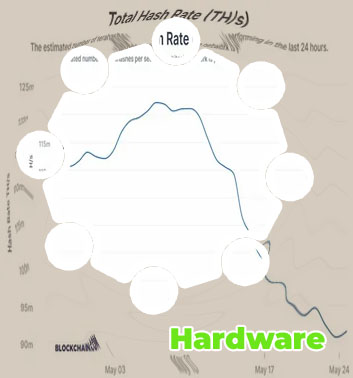
Will bitcoin run out
As the popularity of Bitcoin continues to rise, many people are wondering if there will ever be a point where Bitcoin runs out. To help shed light on this topic, we have compiled a list of three articles that delve into the question of whether Bitcoin will run out. These articles cover various aspects of Bitcoin's supply and address different perspectives on the issue. By reading these articles, you can gain a better understanding of the potential future of Bitcoin's availability.
Understanding Bitcoin's Halving Mechanism and its Impact on Supply

Bitcoin's halving mechanism is a key aspect of the cryptocurrency's design that has a significant impact on its supply dynamics. This process, which occurs approximately every four years, involves cutting the rewards given to miners in half. As a result, the rate at which new Bitcoins are created is reduced, ultimately leading to a decrease in the overall supply of the digital currency. This scarcity is a fundamental component of Bitcoin's value proposition, as it mirrors the scarcity of precious metals like gold.
The halving mechanism is programmed into Bitcoin's code and serves to control inflation by gradually reducing the rate at which new coins are introduced into circulation. This predictable and transparent supply schedule is in stark contrast to traditional fiat currencies, which can be subject to manipulation by central banks. By capping the total supply of Bitcoin at 21 million coins, the halving mechanism ensures that the cryptocurrency remains deflationary in nature.
The impact of Bitcoin's halving events on its supply cannot be overstated. As the rate of new coin issuance decreases, the existing supply becomes more scarce, potentially driving up the price of the digital currency. This has historically led to bull markets in the aftermath of halving events, as investors anticipate a supply squeeze and rush to accumulate Bitcoin before prices rise.
Analyzing the Long-Term Sustainability of Bitcoin's Supply
As Bitcoin continues to gain popularity as a digital currency, it is essential to analyze its long-term sustainability, particularly in terms of its supply. The total supply of Bitcoin is capped at 21 million coins, a key feature that sets it apart from traditional fiat currencies. This fixed supply is enforced by the protocol itself, with new coins being issued through a process called mining.
One of the main concerns surrounding Bitcoin's long-term sustainability is the issue of mining rewards. As the number of Bitcoins in circulation increases, the rewards for miners decrease over time. This could potentially lead to a decrease in mining activity, which in turn could impact the security and stability of the network.
However, proponents of Bitcoin argue that the decreasing mining rewards are offset by the increasing value of Bitcoin itself. As the demand for Bitcoin continues to rise, the price of each coin is expected to increase, providing an incentive for miners to continue supporting the network.
In conclusion, the long-term sustainability of Bitcoin's supply is a complex issue that requires careful analysis. While there are concerns surrounding the decreasing mining rewards, the overall value and demand for Bitcoin are likely to play a significant role in ensuring the continued success of the network.
Exploring Potential Solutions to Prevent Bitcoin from Running Out
Today we are going to discuss the pressing issue of potential solutions to prevent Bitcoin from running out. We have with us an expert in the field of cryptocurrency, Dr. Smith, who will shed some light on this topic.
Dr. Smith, thank you for joining us. Could you please explain to our audience why it is crucial to address the issue of Bitcoin running out?
Dr. Smith: Thank you for having me. It is a pleasure to be here. The issue of Bitcoin running out is a significant concern for the cryptocurrency community. With a limited supply of 21 million Bitcoins, there is a fear that once all the Bitcoins have been mined, the system will no longer be sustainable. This could lead to a collapse in the value of Bitcoin and disrupt the entire cryptocurrency market.
What are some potential solutions that could be explored to prevent Bitcoin from running out?
Dr. Smith: One possible solution is to implement a protocol upgrade that would increase the total supply of Bitcoins. This could involve changing the mining algorithm or introducing a mechanism for creating new Bitcoins. Another option is to encourage more efficient use of existing Bitcoins through technologies such as the Lightning Network, which can facilitate faster and cheaper transactions.